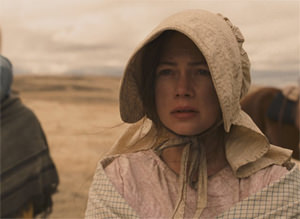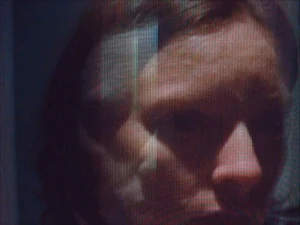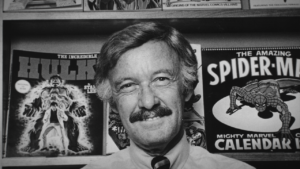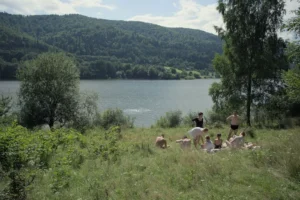‘Meek’s Cutoff’: 104 Minutes You Can’t Get Back
There are times in director Kelly Reichardt’s very bad movie—she’s something of a specialist in low-energy inconsequence -- when we become, despite our better judgment, fascinated by its utter lack of spectacle, by the way it insists on testing our patience. It’s the traditional function of western movies—especially those of the beleaguered wagon train subgenre—to turn what is essentially a painful schlep into epic adventure.
It’s the traditional function of western movies—especially those of the beleaguered wagon train subgenre—to turn what is essentially a painful schlep into epic adventure. This means you’re obliged to say for “Meek’s Cutoff” that it returns this form to most basic elements—three families in three Conestogas, a blustering, blundering and vaguely sadistic trail boss (Bruce Greenwood as the title character) who has no idea where he’s going, and a lone Indian who some in the party think a menace, others a savior, but is rather obviously not the harbinger of a howling mob of savages bent on rapacious mischief. Essentially, he’s what this stupefying movie has in the way of mystery and menace.
Mostly what this underfinanced enterprise requires—aside from a reliable set of turn signals and some Dr. Scholl’s orthotics—is water—as its tiny cast (including such worthies as Michelle Williams, Zoe Kazan and Will Patton) attempts to traverse Oregon’s Cascade Mountains on their way to somewhere or other. A suspenseful script—this one is by Jonathan Raymond — would have helped, too. As it is, we are left to muse on just how slowly teams of oxen drag their way across the barren waste.
But yet there are times in director Kelly Reichardt’s very bad movie—she’s something of a specialist in low-energy inconsequence — when we become, despite our better judgment, fascinated by its utter lack of spectacle, by the way it insists on testing our patience. Despite the film’s plethora of poke bonnets and muzzleloaders, this marks it as a modernist work, implicitly stating that boredom, far from being a vice, is a virtue. Works of this kind, by their very torpor, implicitly criticize livelier films (and other fictions as well), making them seem lowlife, cheesy and sold-out to—OMG—“entertainment.”
Life, as we know, is not a bowl of cherries, and the theory behind movies of this sort is that presumptive art—particularly popular art—should reflect that drear condition. By inducing stupor, something like “Meek’s Cutoff” enhances its connection to reality, and reality, as we all know, is good for us. We may not have had any fun at this movie, or even enjoyed the scenery (generally a minimal pleasure of even the worst westerns), but we emerge from it in a sobered state: It must have been good—all right, make that worthwhile—I’m so glassy-eyed with its existential import that I can’t remember where I parked the car.
OK, I could go on heaping insults on this movie forever. But let me make a more serious point. The implicit subject of all movies is time—how it passes on the screen before us, how it passes for us as we sit twitching in the theater. “Energy,” some wise man once said, “is eternal delight.” What he meant by that, I’ve always supposed, is that however serious an art object is supposed to be, its author owes to his audience something singular to take away—verbal dexterity, for instance. Or larger-than-life characters. Or some sweep and spectacle we’ve not seen before. Or, if you’re determined to go the minimalist route, some exploration of the intricately mixed motives people bring to any worthy enterprise.
Why? Because they have asked for our time, and we have granted it more or less willingly. But more or less suspiciously as well. We are not there merely to chew our cuds. Or, even if we’re adolescents, to await the flatulence jokes. Bad movies go with the cinemaddict’s territory (remember that quaint neologism?). Sometimes I think they are the territory. But there is a difference between wasting time—a risk we always run at the movies—and having it consciously stolen from us, which is what languid and self-congratulatory movies like “Meek’s Cutoff” smugly do.
Your support matters…Independent journalism is under threat and overshadowed by heavily funded mainstream media.
You can help level the playing field. Become a member.
Your tax-deductible contribution keeps us digging beneath the headlines to give you thought-provoking, investigative reporting and analysis that unearths what's really happening- without compromise.
Give today to support our courageous, independent journalists.









You need to be a supporter to comment.
There are currently no responses to this article.
Be the first to respond.